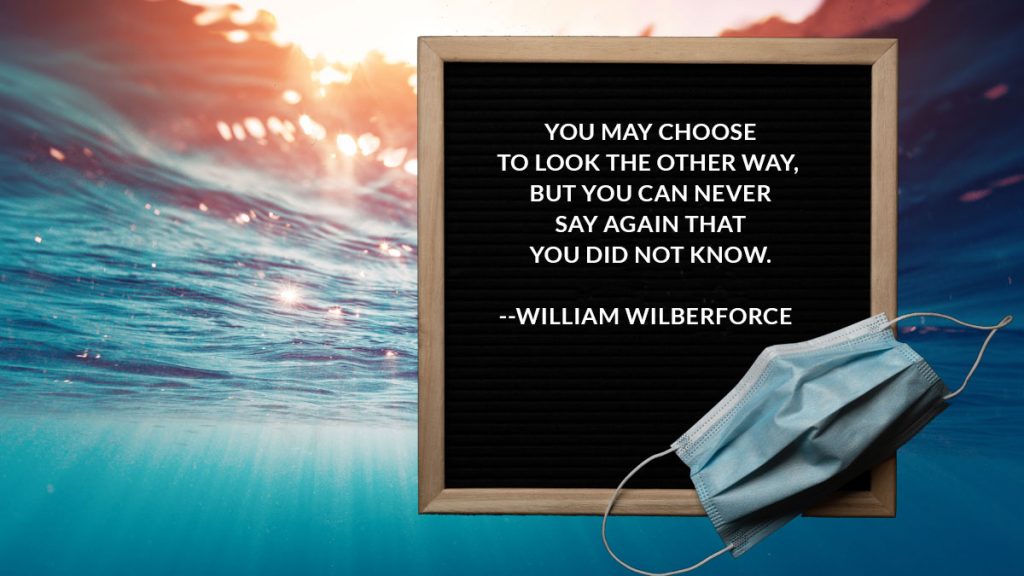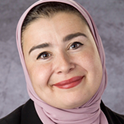
In the beginning there was God…and there was water. Although a majority of my mental and emotional realm has always revolved around God and my relationship with God, I had never really taken the time to reflect on water—its relationship to the Divine and its implications for my own relationship to both God and other humans.
I came to the Justice Fellowship intrigued by the word “Justice.” As a psychiatrist, I am familiar with human pain and suffering. As a Muslim, I am dedicated to ending the pain and suffering of my fellow humans. Exploring the theme of my responsibilities on this earth as they relate to water justice was an opportunity I felt called to seize.
Through the course of this fellowship, my understanding of water and justice in Judaism, Christianity, and Islam has evolved into a deeper recognition of my own role on earth and my duty toward God, the earth, my fellow humans, and myself. In Judaism, I learned that God and water existed together before creation. Water, therefore, became inexorably linked to the Might and Glory of God in my mind, the tool of His creation of the Heavens and Earth and all that is in them. For the first time, I recognized water as Divine, deserving of a respect and appreciation I had never before offered.
Through our studies, I also learned the importance of water in understanding God’s relationship to man. God is the master of the water. In Judaism, a blessing is needed to permit use of water. In Islam, God has “sakhara” water to us, that is, subjected to us what is in the Heavens and what is on Earth. Water is a blessing from the Divine, for which we are to thank and praise Him. In all three faiths, water is not ours, and that understanding is a cornerstone of any discussion of justice. All are made of water, and water is for all. We are not the master, but the humble servant.
The theme of water in all three faiths also clearly delineates man’s relationship to man. The foundation of this relationship is Justice. Judaism, Islam, and Christianity all concede man’s inherent tendency to corruption. In Christianity, we are told that unjust systems of power in this world will face the judgment of God. In Judaism, we know that in a society where some are oppressed, all are implicated. We are to stand for justice and plead for mercy. And in Islam, we are to deal with “Adl” – justly, equitably, and with fairness and proportion. All humans are to be dealt with “qist,” or given their proper due, with balance and equity. It is clear in all three faiths, that we are responsible for one another; we are a human family.
In these discussions, the idea that most took root in my mind was that of mercy. God gave us water (and life) in an act of overwhelming mercy. The degree to which we have mercy upon one another in the sharing of resources – especially water – is the degree to which we are just. When we withhold this mercy, we are unjust. We are oppressors. And when we allow this mercy to be withheld, we are oppressors as well. As we learn in Judaism, bystanders cannot plead innocence. When we respect water and each human’s right to it, we respect Mercy.
This recognition of water as a mercy is crucial in understanding the nature of Revelation. In Judaism, there is “no water except Torah.” In Islam, God “nazala,” or “brings down,” water just as He “nazala” (brings down” Revelation. Just as water is the very foundation of creation, so Revelation is the foundation of our soul. Just as water rejuvenates the earth, scripture softens and revives our hearts. In the Islamic version of the story of Noah, his people were oppressors with no mercy in their dealings. Their hearts were hard and incapable of accepting Revelation, just as their land was hard and incapable of absorbing the waters of the flood. In this way, God destroyed hardness to make room for empathy.
As humans in relationship with God, ourselves, and our fellow humans, it is this element of Mercy that is key. Water is a tangible expression of this mercy and a constant reminder to us to act with compassion to enact justice on earth.
The explorations of this fellowship into the themes of water and justice in all three faiths has renewed my dedication to mercy in all my interactions in my own spheres of influence. As a health care professional working during the COVID pandemic, our practice was replete with issues of justice: access to information; equity in access to healthcare; just provision of adequate PPE; access to testing; and accessibility of mental health resources, to name a few. Through my discussions within the fellowship, my responsibility to establish justice was in the forefront of my mind, and I was aware of just how much this affected my daily decisions and interactions with staff, colleagues and, most importantly, my patients.
Above all, with my renewed awareness of mercy and justice, I noticed how much more effectively I could improve other peoples’ lives in ways both small and not-so-small. This insight has revived within me a firm commitment to justice for, as abolitionist William Wilberforce said, “You may choose to look the other way, but you can never say again that you did not know.”
 Rascha Dughly, MD is a psychiatrist, neurologist, assistant clinical professor of psychiatry at the University of Maryland School of Medicine, and a member of the 2020 ICJS Justice Leaders Fellowship.
Rascha Dughly, MD is a psychiatrist, neurologist, assistant clinical professor of psychiatry at the University of Maryland School of Medicine, and a member of the 2020 ICJS Justice Leaders Fellowship.
Baltimore is part of a national conversation around questions of justice, race, and community. Members of the ICJS Justice Leaders Fellowship consider how Jewish, Christian, and Muslim teachings and practice can contribute to the public conversation about (in)justice. Opinions expressed in this blog are solely the author’s. ICJS welcomes a diversity of opinions and perspectives. We do not seek a single definition of justice between or within traditions.